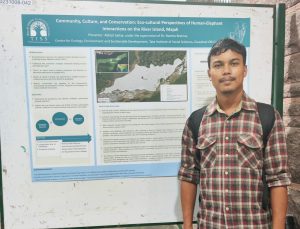Guwahati, Nov 2: A young researcher associated with the region’s premier biodiversity conservation organisation, Aaranyak (www.aaranyak.org) has delved into how religious beliefs-induced eco-cultural practices of a grassroot community that can go a long way in facilitating human-wild animal coexistence.
He presented a paper on his work at a national-level students conclave to highlight his findings in the work done in the field so far.
Young researcher Abhijit Saikia of Aaranyak presented his research work titled “Community, Culture and Conservation, Eco-cultural Perspectives of Human-Elephant Interactions on the river island, Majuli at the recently held Students Conference on Conservation Science (SCCS) at IISC, Bangalore.

His research findings highlight that religious beliefs can significantly influence the sociocultural perspectives of local communities, resulting in the development of eco-cultural practices that facilitate peaceful coexistence between humans and elephants in parts of Majuli, the culturally rich river island district of in Assam.
Such research holds the promise of offering long-term solutions to the escalating HEC and incorporating these ideas into policy-making and awareness programmes to work out sustainable solutions, enhance institutional frameworks, promote cultural diversity,and facilitate more effective community engagement.
This study was a part of Abhijit’s masters dissertation under the guidance of Dr. Namita Brahma of the Tata Institute of Social Sciences, Guwahati Off-Campus and Aaranyak’s senior scientist Dr. Bibhuti Prasad Lahkar.



